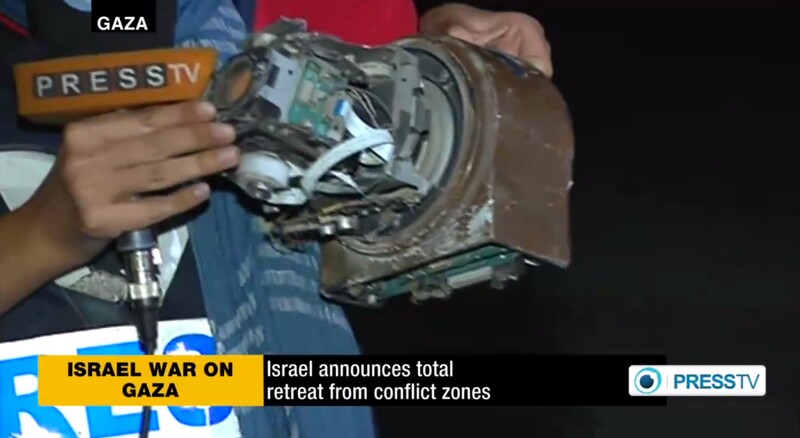Rights and Accountability 20 April 2015

Press TV showed this missile part found in Gaza that includes a camera the reporter said was marked as manufactured by Sony.
Sony Pictures Entertainment co-chair Amy Pascal was proud to add her name to a letter with some 200 other Hollywood big wigs supporting Israel last summer in the midst of its bombardment of the occupied Gaza Strip.
But leaked emails released recently by Wikileaks show that behind the scenes company executives were worried about reports associating the Sony brand with the Israeli assault that left more than 2,200 people, 547 of them children, dead.
On 19 August, Stevan Bernard, Sony Pictures Entertainment’s head of corporate security, wrote to David Diamond, executive assistant to company chairman and CEO Michael Lynton, to inform him about a media report “that Sony CCTV’s [sic] were being used as a part of the guidance system for Israeli rockets that were bombing Gaza.”
“In fact,” Bernard wrote, “they held up part of the camera housing for all to see.”
Diamond forwarded the email directly to his boss Lynton, who sent it onward to Nicole Seligman, president of Sony Corporation of America, the company’s electronics division.
Bernard reassured his superiors that the report was “Nothing to be alarmed at right now,” but informed them of a related social media report that mentioned several top executives, including Lynton and Pascal.
He forwarded a link to a Facebook posting calling for Sony to be boycotted over the matter and urging a public campaign in support of actors Javier Bardem and Penelope Cruz who had faced criticism for speaking out against the Israeli attack.
“It was not threatening and it has not materialized,” Bernard wrote of the posting, which he pointed out had only garnered a handful of “likes.”
“The entire matter seems to have calmed,” Bernard added. ”We will continue to monitor this.”
Pascal left Sony earlier this year facing recriminations over the massive leak of company emails and information. Lynton remains CEO and chair.
Missile allegedly contained Sony camera
Bernard included a link to the report from Iran’s Press TV in which reporter Halla Alsafadi talks about visiting the Gaza village of Khuzaa, east of Khan Younis, where dozens of civilians had been killed by Israeli forces that had been besieging it.
At one point, Alsafadi holds up a piece of equipment that looks like it came from the head of a missile, drone or bomb.
“This is another part of an F-16 rocket,” Alsafadi states. “It is made in Japan, it states this very clearly. ‘Sony’ and made in Japan. There is a camera right in front of this piece of a rocket. With this camera, they actually choose their target and kill their target.”
While the item Alsafadi is holding does appear to be a camera affixed to a missile part, she does not hold it close enough to the TV camera for the markings she quotes to be seen by the viewer.
In September, the Business and Human Rights Resource Centre, a nonprofit group that tracks “the human rights abuse and advances of companies around the world,” said Sony “would not respond to the allegations” in the Press TV report.
But according to the group, Sony told Japanese media that it “does not design, manufacture, or sell weapons or any products intended for use in weapons.”
It is not surprising that Sony would not want its equipment associated with the Israeli military since Amnesty International has said Israeli forces displayed “callous indifference” to civilian lives in Gaza in attacks amounting to “war crimes.”
But Sony’s lack of transparency raises the question of whether third parties are installing its equipment in weapons with or without its direct consent and whether it should exercise more control over end users.





Comments
Sony camera
Permalink Guy replied on
If this can be substantiated ,Sony needs to be boycotted.
boycott sony
Permalink mohammed replied on
i'm glad i don't have anything from sony at this time, and from now on i will make sure i don't buy any